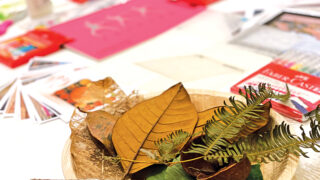Verne Maree ponders why it is that some women are content to go through life childless, or without having children of their own – while others yearn for them so deeply, even desperately, that their lives feel incomplete without motherhood.

I was always ambivalent about having children. Maybe that’s not surprising, as my own mother did her best to put us off the whole idea. Marriage? Not all it was cut out to be. Pregnancy? Akin to an alien invasion. Giving birth? Like the tortures of the damned.
So, apart from a period of broodiness around the age of 27, I’ve generally felt I could either take it or leave it. If the time and place had been right, had I been in a stable relationship with a suitable man who wanted to have a baby with me, I might have done it. Instead, I fell in love with an older man with three teenage children and a vasectomy. And I married him with not a shred of regret.
Blame it on the Devil
Throughout human history there have been childless women, but – unlike myself – they were generally not childless by choice: in most societies, the penalties were too daunting. From as far back as ancient Egyptian times, and in many cultures all over the world, spinsters and other childless women have been pitied, despised or ostracised for not having fulfilled their purpose in life.
In the Middle Ages, infertility – or “barrenness” – was usually blamed on the Devil, or on the spells of witchcraft. The childless woman herself might be pointed out as a witch and possibly even put to death.
Pope Innocent VIII issued a papal bull in 1484 declaring witches to be heretics, at a time when the stereotype of a witch was a dangerous, lonely old woman. Between the early 14th and the mid-17th centuries, it’s estimated that up to half a million so-called witches were executed in Europe alone, 85 percent of them women.

How far have we come?
So, how are childless women treated here and now? It depends where you find yourself. In parts of Sub-Saharan Africa, for example, huge importance is still placed on fertility, and a woman’s social and economic status continues to hinge on it. If a couple is childless, the woman is generally blamed, and risks everything from social stigma and ridicule to physical violence, abandonment and divorce.
You’d think Western societies would be completely different, but are they? A recent study in modern-day Australia, where almost a quarter of all women will remain childless (or “childfree”, as some prefer to call it), revealed that childless women feel stigmatised and socially excluded, even to the extent that it affects their mental health. “They felt mothers were valued, and that women with no children were not.”
Sadly, it showed that only about a third of currently childless women aged 25 to 44 had consciously decided not to have children; another third were either undecided, or were still planning to have children. Twenty-one percent were childless through circumstance, such as the lack of a partner; eight percent through fertility or other medical issues.
For whom the clock ticks
Clara*, a friend of a friend of mine, turned 40 last month, having always assumed that by that age she’d have “met someone and had kids”. She was around 38 when she acknowledged that it wasn’t likely to happen in the next two years, she says, adding: “Even if it did, did I really want to become a mother at the age of 40?”
Like others, she’d thought about going the single mother route. As a professional, a radiographer working within the UK health system, she’d be financially capable of supporting both herself and a child. But after long consideration, she chose not to.
Instead, she spends her savings on travel, and her free time on physical pursuits like yoga, running and gym. She is fitter and slimmer than she’s ever been. Sex isn’t lacking, either: she is happily enjoying a long-term casual relationship that she blithely admits is “going nowhere”. She also has a beloved niece, her sister’s child, to love and spoil.
Tina’s twins
Life took a very different turn for Tina*, a gorgeous and warmhearted South African fashion designer. When a promising * names have been changed ten-year relationship ended, she knew exactly what she wanted for her 30th birthday: to have a baby by means of artificial insemination – the procedure in which sperm are placed in the uterus by means of a syringe.
Luckily for Tina, her parents were thrilled by her decision and, being well-off, promised to support their only child in every way that counted. That included being there to help with childcare – an important consideration when Tina gave birth to twins! – plus setting up a trust to cover their grandchildren’s private school and tertiary education. All went according to plan, and the twins – a girl and a boy who are spitting images of their mother – turn 16 this year.
Just a thought
I accept that not having babies can mean that you miss out on, well, having babies, and also on the physical, mental, emotional, familial and social experiences that may come with parenthood in general and motherhood in particular.
That said, it bothers me to think of those childless women in the Australian study who said they felt excluded and marginalised. It’s desperately sad to think of women so lost in grief for their unborn babies that they’re unable to get on with their lives.
This is an era where a woman’s life is her own, and a single woman is no longer written off as a pathetic, dried-up old spinster. There should be absolutely no stigma. The same goes for being “child-free”, whether by choice or by circumstance. From my own perspective, the time and energy that children require can be channelled into other useful, fruitful and exciting pursuits.
So, while we celebrate the promise of fertility, the unfolding of pregnancy and the joy of childbirth, let’s also celebrate a woman’s freedom to choose how to live her life and where to direct her precious energies.
* names have been changed
Like this? Read more at our wellness section.



